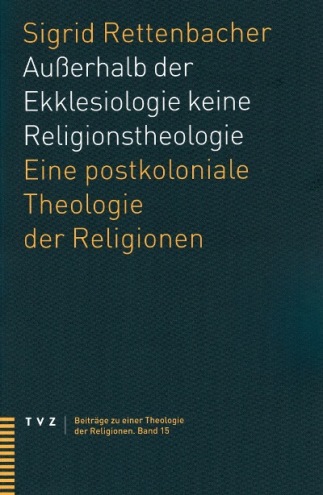Sigrid Rettenbacher:
Außerhalb der Ekklesiologie
keine Religionstheologie.
Eine postkoloniale Theologie der Religionen
Beiträge zu einer Theologie der Religionen (BThR),
Band 15. Zürich: TVZ 2019, 543 S.
Zugleich Diss. Universität Salzburg
— ISBN 978-3-290-18208-3 —
Vorstellung im Rahmen von BThR:
https://buchvorstellungen.blogspot.com/2013/12/auf-dem-weg-zu-einer-universalen.html
lnhaltsverzeichnis
und ausführliche Leseprobe >>>
Ausführliche Rezension >>>
Dialogisches Kirchenverständnis und Glaubwürdigkeit
postkolonialer Religionstheologien
Die katholische Theologin Sigrid Rettenbacher (Universität Salzburg) macht mit ihrer Arbeit deutlich, dass erkenntnistheoretische und ekklesiologische Perspektiven Teil einer postkolonialen Religionstheologe sein müssen. Denn in solchen Diskursen sind christliche Identitätsmuster daraufhin zu überprüfen, wie sie Absolutheitsansprüche hermeneutisch und machtpolitisch durchsetzen. Darum müssen exklusive Deutungen dekonstruiert, aber auch pluralistisch-christologische Relativierungstendenzen (im Sinne einer Nivellierung im Verhältnis von Gott und Mensch) problematisiert werden. Eine christliche postkoloniale Religionstheologie muss im Rahmen einer die Kontexte und Differenzen bearbeitenden Hermeneutik die zentralen Fragen nach Wahrheit und Heil dialogisch und zugleich ekklesiologisch bezogen angehen. Dies hat erhebliche Folgen für das jeweilige Identitätsverständnis im Rahmen der eigenen religiösen Tradition. Katholischerseits hat das 2. Vatikanische Konzil hier entscheidende Impulse für einen interreligiösen Dialog im Horizont des Anderen in seinem Anderssein geliefert. Allerdings erhebt sich die Frage, ob dafür doch eine weiter gehende ekklesiologische Neubestimmung nötig ist, und zwar im Sinne eigener Identitätserweiterung durch den Dialog der Religionen.
English summary:
Dialogical understanding of the church and
credibility of postcolonial theologies of religion
The Catholic theologian Sigrid Rettenbacher (University of Salzburg) reveals with her work that epistemological and ecclesiological perspectives must be part of a postcolonial theology of religion. For in such discourses Christian identity patterns must be examined insofar they hermeneutically and power-politically enforce absolute claims. For this reason, exclusive interpretations must be deconstructed, but also pluralistic-Christological tendencies of relativisation (in the sense of a leveling in the relationship between God and man) must be problematized. A Christian post-colonial theology of religion must, within the framework of a hermeneutics dealing with contexts and differences, approach the central questions of truth and salvation in a dialogical and at the same time ecclesiological way. This has considerable consequences for the respective understanding of identity within the framework of one’s own religious tradition. On the Catholic side the Second Vatican Council has here provided decisive impulses for an interreligious dialogue in the horizon of the other in his otherness. But there raises also the question if there is yet necessary a further-reaching ecclesiological redefinition, namely in the sense of one’s own identity extension by the dialogue of religions.
Résumé français:
Compréhension dialogique de l’église et crédibilité des théologies
de religion postcoloniales
La théologienne catholique Sigrid Rettenbacher (Université de Salzbourg) précise dans son travail que les perspectives épistémologiques et ecclésiologiques doivent faire partie d’un théologie de religion postcolonial. Car dans de tels discours, les modèles d’identité chrétienne doivent être examinés quant à la manière dont ils appliquent herméneutiquement et politiquement des revendications absolues. C’est pourquoi il faut déconstruire les interprétations exclusives, mais aussi problématiser les tendances pluralistes et christologiques d’une relativisation (au sens d’un nivellement de la relation entre Dieu et l’homme). Une théologie chrétienne post-coloniale de la religion doit, dans le cadre d’une herméneutique traitant des contextes et des différences, aborder les questions centrales de la vérité et du salut de manière dialogique et en même temps ecclésiologique. Cela a des conséquences considérables sur la compréhension respective de l’identité dans le cadre de sa propre tradition religieuse. Du côté catholique, le Concile Vatican II a donné ici des impulsions décisives pour un dialogue interreligieux à l’horizon de l’autre dans son altérité. Mais il faudra demander si, pour cela, une redéfinition ecclésiologique de rayon plus vaste soit nécessaire, à savoir dans le sens d’une extension de sa propre identité par le dialogue des religions.
Resumen español:
Comprensión dialógica de la Iglesia y
credibilidad de teologías poscoloniales de religion
La teóloga católica Sigrid Rettenbacher (Universidad de Salzburgo) deja claro con su trabajo que las perspectivas epistemológicas y eclesiológicas deben formar parte de una teólogía poscolonial de la religión. Porque en tales discursos se debe examinar cómo los modelos de la identidad cristiana imponen hermenéuticamente y políticamente reivindicaciones absolutas. Por esta razón, hay que deconstruir las interpretaciones exclusivas, pero también hay que problematizar las tendencias pluralistas-cristológicas de relativización (en el sentido de una nivelación de la relación entre Dios y el ser humano). Una teología cristiana poscolonial de la religión debe, en el marco de una hermenéutica que trate los contextos y las diferencias, abordar las cuestiones centrales de la verdad y de la salvación de manera dialógica, y al mismo tiempo eclesiológica. Esto tiene consecuencias considerables para la respectiva comprensión de la identidad en el marco de la propia tradición religiosa. Por parte de los católicos, el Concilio Vaticano II ha dado aquí impulsos decisivos para un diálogo interreligioso en el horizonte del otro, en su alteridad. Pero habrá que preguntarse si para ello es necesario, sin embargo, una redefinición eclesiológica de mayor alcance, en el sentido de una ampliación de la propia identidad por el diálogo de las religiones.
Traducción: Jose María Vigil, Ciudad de Panamá
Reinhard Kirste
